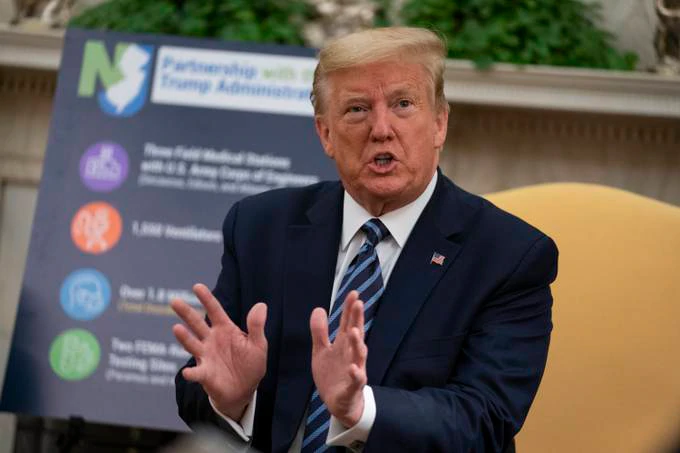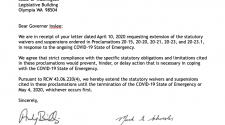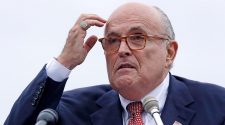with Tonya Riley
The coronavirus is leading to an explosion of cellphone monitoring around the world, as the pandemic prompts people to recalculate their positions on privacy issues.
Roxanne Halper, who leans to the left of Israel’s political spectrum, would normally be wary of government surveillance, my colleagues Kareem Fahim, Min Joo Kim and Steve Hendrix report. Yet the 60-year-old working in international development recently downloaded an Israeli government virus tracing app that uses smartphone data to alert people whether they are in contact with anyone who tested positive. She says health concerns seem more urgent than privacy worries.
“I feel like I should have a problem with it and yet I don’t,” Halper told my colleagues during an interview from her home on a small kibbutz between Jerusalem and Tel Aviv.
A commuter wearing a protective mask and gloves checks his mobile phoneREUTERS/Susana Vera
She took consolation each day it notified her that she had no known contact with any known coronavirus cases. “I take comfort from that,” she said. “I can’t be afraid of the [risk to privacy] right now. I’m much more afraid of corona and what it’s doing to society,” she said.
There’s a similar privacy vs. public health debate brewing in the United States.
The pressure is on for the United States to in the footsteps of other countries that expanding contact tracing, as states begin reopening and cases surge past 1.1 million. More than 67,000 people have died in this country.
At least 30 countries have developed coronavirus smartphone apps for the public to download, according to Edin Omanovic, the advocacy director at Privacy International, which is keeping a record of surveillance programs. And some countries have turned to much more invasive technologies to stop the virus’s spread, such as in China, where the government assigns citizens smartphone codes based on their likelihood of exposure that dictate their movements.
But the United States, now the pandemic’s epicenter, has been much warier of rolling out even voluntary apps amid a growing debate about the privacy implications of using Americans’ data to fight the virus.
The federal government has yet to say how it plans to use technology as it seeks to expand contact tracing.
That’s striking given Apple and Google are making developer tools available to government health agencies to build such apps. The Centers for Disease Control and Prevention recently published a document that outlines early criteria for digital contact tracing tools, which could be a guide for public health departments as they decide what technologies to use.
CNBC reports that the guidelines could be good news for the Apple and Google tools, because the guidelines cites Bluetooth contact tracing tools developed by Massachusetts Institute of Technology that have many similarities to the system that the tech companies are rolling out.
Some states, including Utah and North Dakota, have launched their own apps that use location data to detect if people have been near known covid-19 cases.
My colleagues note that people have appeared more willing to accept such surveillance in countries that have been more successful at battling the virus — such as Singapore, where the government has rolled out an Bluetooth-enabled app that alerts people whether they’ve been in proximity to a positive case.
Lawmakers on Capitol Hill are seeking to put guardrails in place on how technology is used to mitigate the spread of the coronavirus.
Several Republican lawmakers, led by Senate Commerce Committee Chairman Roger Wicker (Miss.), are planning this week to introduce privacy legislation that aims to draw new limits around personal health, geolocation and proximity data that companies use to track the coronavirus.
Yet Democrats are concerned that the bill’s language may fall short in protecting the data that phones exchange with the Apple-Google tools. They’re also concerned that it does not prohibit people from reporting coronavirus cases without confirmed, positive tests – which privacy experts have said could lead to false reports.
The lawmakers have struggled for years to reach a consensus on federal privacy legislation. The Republican bill would override any state laws. That’s already been a sticking point between the parties previously for more general privacy legislation.
Privacy advocates have also said the proposal does not go far enough in protecting Americans’ data.
Sara Collins, policy counsel at privacy rights watchdog group Public Knowledge, said in a statement to The Verge that the legislation was “a privacy ‘cure’ worse than the disease,” and amounted to “deregulation disguised as consumer protection.” The bill doesn’t include resources for the Federal Trade Commission to enforce it, Collins said.
“The only ‘restrictions’ apply to data specifically collected for coronavirus contact tracing,” she said. “To make matters worse, the bill gratuitously preempts the much stronger [Federal Communications Commission] privacy protections governing mobile carriers. These protections have been used to ensure data on mobile phones are not shared with third parties without the user’s permission. As a final insult to consumer privacy, the bill would preempt the states from adopting or enforcing any stricter privacy protections in the absence of strong federal protections at the FTC.”
It’s still unclear whether enough Americans would use a voluntary contact-tracing app for it to be effective.
A Washington Post-University of Maryland poll published last week found nearly 3 in 5 Americans are unwilling or unable to use the contact-tracing technology that Apple and Google are developing. What’s more, nearly one in six Americans do not have smartphones, and phone ownership is even lower among older Americans who are more vulnerable to the virus.
Adoption in the United States would be a key impediment because a significant number of Americans would need to participate for the tech to be effective. Oxford University researchers have said 60 percent of a country’s population would need to be participate for the apps to be effective.
Meanwhile, other countries are pushing forward with apps. Germany and Italy have recently supported the Google-Apple approach.
Our top tabs
Bill Gates saw the coronvirus coming. Now he’s pushing for science-based solutions to return to normal.

Bill Gates is co-chair of the Bill and Melinda Gates Foundation. (Takaaki Iwabu/Bloomberg News)
The $250 million the Gates Foundation has put toward finding a cure for the virus comes after decades of work by Gates and his wife Melinda to stop the spread of global disease, Jay Greene reports. Gates’s work has put him in frequent communications with Anthony S. Fauci, a leader of the administration’s pandemic response and the director of the National Institute of Allergy and Infectious Diseases.
But the Gates Foundation’s research has also put him at odds with President Trump, who has pushed untested cures. Gates criticized the president’s plans in early April to cut new funding for the World Health Organization.
Halting funding for the World Health Organization during a world health crisis is as dangerous as it sounds. Their work is slowing the spread of COVID-19 and if that work is stopped no other organization can replace them. The world needs @WHO now more than ever.
— Bill Gates (@BillGates) April 15, 2020
But Gates has stopped short of directly criticizing President Trump. Those around Gates say his reserve is a strategic move driven by the need for government support.
“You have to pick your spots,” said Sue Desmond-Hellmann, former chief executive of the Gates Foundation. “Obviously, the WHO comment was of the magnitude that Bill and Melinda spoke out and said that the world needs the WHO.”
Gates also appeared on ‘The Late Show With Stephen Colbert’ last month to talk about the lack of preparedness for the pandemic.
Gates tells Jay his role is to facilitate innovation. “People are hoping for U.S. leadership. It’s still an opportunity we haven’t seized,” Gates said. “The vacuum of waiting for the U.S. to step in and help out with that, there’s still a huge opportunity there.”
A Democrat-leaning group will use technology developed to fight Islamic State propaganda to analyze the president’s claims about the virus on social media.

President Trump speaks during a meeting about the coronavirus response with New Jersey Gov. Phil Murphy at the White House on April 30. (Evan Vucci/AP)
Defeat Disinfo, a political action committee, will use artificial intelligence and network analysis to map the posts, Isaac Stanley-Becker reports. It then enlists a network of more than 3 million influencers, some paid, to combat the narrative.
The group is hoping to combat a strong grass-roots digital army that continues to back Trump’s handling of the pandemic. Republicans “have greater volume frequency and quality of the digital narrative,” says Curtis Houghland. Houghland cited the pushback on Twitter defending Trump’s suggestion that disinfectants could cure the coronavirus, which he says was led primarily by four accounts partial to the president.
Defeat Disinfo is an extension of Houghland’s company Main Street One, which uses the same technology Houghland developed to help combat Islamic extremism using Pentagon funding.
“It’s often said campaigns are a battle of ideas, but they’re really a battle of narratives,” said David Eichenbaum, a Democratic media consultant who is a senior adviser to the PAC. “Today those narratives spread quickly online.”
But not all Democrats are on board with the idea of paying influencers. More traditional PACs have shied away from the tactic and so far, so has former vice president Joe Biden.
Former Google CEO Eric Schmidt has become Silicon Valley’s top adviser to the military.

Eric Schmidt is seen in 2017 in the lobby of Trump Tower in New York. (Jabin Botsford/The Washington Post)
But his work, which is under investigation for allegedly putting his financial interests in Google ahead of the military, paint a path full of setbacks, Kate Conger and Cade Metz report.
Schmidt led Google’s efforts to deploy artificial intelligence for the Pentagon’s Project Maven. But employee protests in 2018 caused internal strife at Google, and the company decided not to renew the contract in 2018.
That didn’t stop his work: He helped launch an AI center in 2018 backed by the Pentagon and was named co-chair of a group advising Congress on developing AI for defense. But his investment in a software start-up, Rebellion Defense, alongside his billions in remaining Google financial stakes have sparked controversy.
In September, the Electronic Privacy Information Center, a nonprofit privacy and civil liberties group, sued the AI commission he serves on for failing to turn over records about his involvement.
Schmidt denies conflicts of interest. “Everybody is rule-bound at the Pentagon, and we are too,” he told the Times.
Competition watch
House lawmakers want Amazon CEO Jeff Bezos to testify at an upcoming hearing on antitrust violations.

Amazon founder and chief executive Jeff Bezos. (Mandel Ngan/AFP/Getty Images)
The lawmakers say they are willing to subpoena Bezos if he doesn’t agree to show, Tony Romm and Jay Greene report.
Lawmakers pointed to recent reporting that suggests that Amazon may have lied at a July hearing when officials said the company does “not use seller data to compete with them.”
Rep. David N. Cicilline (D-R.I.), the chairman of the antitrust subcommittee, raised the possibility that the company committed perjury.
In light of the gravity of this situation, I am also considering whether a perjury referral is warranted.
— David Cicilline (@davidcicilline) May 1, 2020
F. James Sensenbrenner Jr. (R-Wis.), the second-most senior member of the House, also signed the request, indicating bipartisan support for the hearing. Amazon did not respond to a request for comment. Bezos owns The Washington Post.
More in competition watch:
Workforce report
Uber will start requiring drivers to wear masks, and the company is developing a technology to detect whether they’re complying.
The plan comes as the ride-share giant prepares for parts of the country to reopen, as Sara Ashley O’Brien at CNN first reported. Uber confirmed the plans to CNN.
The company already uses face-verification technology to check the identity of drivers. Uber began shipping masks and disinfectant spray in April, but not all drivers have received supplies.
Kickstarter’s union reached an agreement with the crowdfunding company to guarantee laid off employees four months of severance.
The deal also guarantees four to six months of additional health care. Kickstarter announced layoffs of up to 45 percent last month. Kickstarter employees voted to unionize as members of the Office and Professional Employees International Union Local 153 in February.
The digital race to 2020
Joe Biden’s small digital team is betting big on feel-good news to win over voters online.

Presumptive Democratic presidential nominee Joe Biden. (Kevin Lamarque/Reuters)
The approach is the opposite of the Trump campaign’s efforts to maximize social media algorithms with negative content bashing his opponents, Alex Thompson at Politico reports.
“Empathy is just as good at getting engagement,” said Biden’s digital director, Rob Flaherty. “The suburban Facebook empathy moms that we think about a lot, those folks are just hungry for the contrast between the darkness of Donald Trump and the goodness of Joe Biden.”
The push has come with some success. Views across platforms increased from 27.4 million in February to 61.7 million in March and 51.1 million in April.
But digital strategists say it takes months to build up a committed online following, possibly making Biden’s recent efforts too late.
Moreover, Biden has largely stuck to traditional cable and radio appearances. And unlike digitally savvy primary opponent entrepreneur Andrew Yang and Sen. Bernie Sanders (I-Vt.), Biden has yet to dabble in the quirky world of “podcasters, YouTubers and Instagram influencers.”
Hill happenings
Rep. Jennifer Wexton (D-Va.) launched a task force to encourage the responsible use of technology when engaging with society.

Rep. Jennifer Wexton (D-Va.) speaks during a Capitol Pride brunch at the Human Rights Campaign on behalf of the LGBT Equality Caucus on June 8 in Washington. (Oliver Contreras for The Washington Post)
The congressional Task Force on Digital Citizenship will bring together policymakers, nonprofits and businesses to discuss best practices regarding identifying misinformation and disinformation, digital literacy education, cyberbullying and privacy. Initial partners include Common Sense, a nonprofit advocacy group that works on children’s safety issues in media and technology.
“Our children and families are spending more time online than ever before as they navigate an increasingly digital world — Congress needs to keep pace,” said Wexton.
More from the Hill:
Rant and rave
Facebook added its first new reaction emoji since 2016. The social network announced the “care” emoji in response to the coronavirus last month, but users began to notice it over the weekend.
Some appreciated the gesture of comfort. CNET’s Marta Franco:
OK Facebook’s new cheesy emoji is my new favorite emoji. pic.twitter.com/ez4QNJTWG1
— marta franco (@marmotilla) May 1, 2020
Others questioned its utility. The New York Times’s Elizabeth Bruenig:
My colleague Hannah Jewell:
paying my rent tomorrow with the new facebook emoji pic.twitter.com/gyVKvpt3Zq
— Hannah Jewell (@hcjewell) April 30, 2020
Emoji expert Emojipedia weighed in on how to re-create the expression on other platforms.
In theory, 🤗 Hugging Face would be close, if it looked more like a hug, and less like jazz-hands. Perhaps 🤗❤️ in sequence?
For a single emoji, 🥰 has the closest vibes to Facebook’s new Care reaction. With a small dose of 🥺 https://t.co/AMX3zTB3mf
— Emojipedia 📙 (@Emojipedia) April 30, 2020
Trending

The first “high fashion runway show entirely from home” just took place, complete with famous models and designers. The clothes were the least of it.
The New York Times
Bookmark this

Wearing a striped shirt and Matrix-style dark glasses, Onel de Guzman stared at the floor as he made his way through a crowd of photographers into a hastily arranged press conference in Quezon City, a suburb of the Philippines capital Manila.
CNN
Mentions
Georgetown Law has named Hillary Brill as the new interim executive director of its Institute for Technology Law & Policy. The law school also named Jennifer Sturiale as the school’s first program director for technology law and policy academic programs.
Brill is the founding partner at HTB Strategies and previously served as senior global counsel at eBay. Sturiale was a Climenko Fellow at Harvard Law School.
Daybook
- Lyft, Square and Paypal report earnings on Wednesday.
- Uber reports earnings on Thursday.
Before you log off
Tech executives commencement addresses look a little different this year. Here’s Apple chief executive Tim Cook:
















